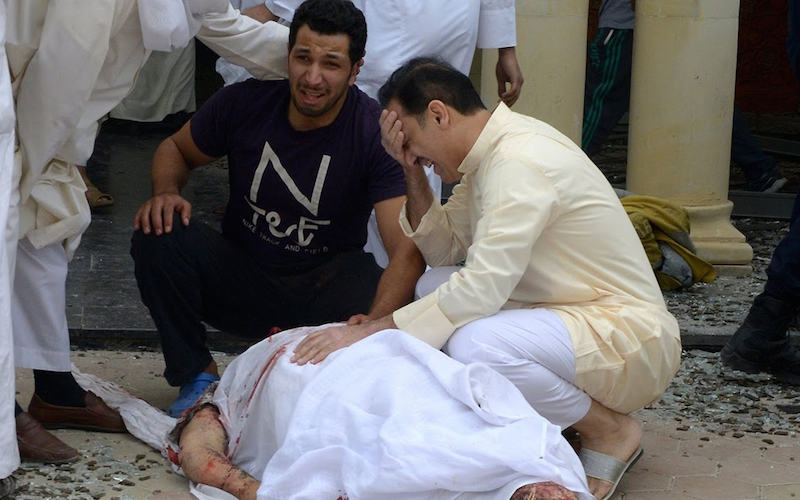
Islamic State Attacks Kuwait
On June 26, a Saudi Arabia-based group affiliated with the “Islamic State” (Daesh) took credit for a terrorist attack in the historic Imam Sadiq Mosque, located in the heart of Kuwait’s capital. The suicide bomber detonated his explosives-laden vest while 2,000 Shi’ites were in Friday prayers, resulting in 27 deaths and 227 injuries. The attack, waged during the Muslim holy month of Ramadan, further confirmed Daesh’s intention to foment sectarian strife not only in Saudi Arabia, but also in the smaller Arab monarchies of the Persian Gulf.
Throughout the last decade, the relatively wealthy and stable Emirate of Kuwait has been spared the chaotic unrest and sectarian violence that has wreaked havoc across other Arab nations. The last time that Kuwait experienced an act of terrorism on this scale was in 2005, when an al-Qaeda affiliate (Peninsula Lions) exchanged fire with security forces in Kuwait City, resulting in 13 deaths. Last Friday’s attack was an alarming development for Kuwait’s authorities, who must now face the reality that Daesh has its sights set on the emirate, where roughly one third of the population is Shi’ite. Moreover, the likelihood that the terrorist attack was coordinated with local networks is further evidence that Daesh has loyalists among Kuwait’s hardline Salafists.
Shortly after the blast, the Daesh affiliate — Najd Province — posted a message on Twitter claiming responsibility. The message stated that one of its members had blown himself up in a “temple of the apostates,” a derogatory reference to Shi’ites. Najd Province was also behind the deadly attacks on Shi’ite mosques in eastern Saudi Arabia during Friday prayers on May 22 and 29.
Two days after the attack in Kuwait City, authorities identified a young Saudi Arabian national, Fahd Suliman Abdul-Muhsen al-Qabaa, as the suicide bomber.
Officials stated that he had flown into Kuwait International Airport from Bahrain several hours before detonating himself, the timing of which implies that he had been collaborating with a local network. It remains unclear if the attack was directly linked to two other attacks (either orchestrated or inspired by Daesh) that claimed lives in France and Tunisia that same day.
Five suspects linked to the terrorist attack face legal action. The Interior Ministry said the driver and the owner of the Japanese-made car, which carried Qabaa to the Shi’ite mosque, were both taken into custody. The driver, identified as a 26-year-old illegal resident named Abdul-Rahman Sabah Aidan, was found hiding in the al-Riqqa area. The ministry reported that the owner of the house where Aidan hid was a Kuwaiti national involved with a “deviant ideology” (a term that Gulf Arab authorities use to refer to Daesh) who was detained shortly after the attack. The car owner’s brother and the house owner’s brother were also arrested for their alleged involvement.
While many facts surrounding the Imam Sadiq Mosque attack remain unknown to the public, there is much to say about the context in which Daesh targeted Kuwait and the challenges that Kuwaiti officials face in terms of thwarting future Wahhabi terrorist attacks.
Sectarian Relations in Kuwait
In recent decades Kuwait’s Sunni majority and Shi’ite minority have lived in greater harmony than have the two sects in neighboring countries, especially in Iraq. The state of amicable relations between Kuwait’s Sunnis and Shi’ites is largely attributable to the monarchy’s having granted the Shi’ites equal access to public benefits (health care, housing, education, fuel subsidies, government jobs, etc.), as well as their inclusion in the national parliament.
Since Saddam Hussein’s 2003 ouster and the subsequent spread of Iranian influence in the Arab world, sectarian tensions in other Sunni Arab states have intensified. Yet during this time, Kuwait’s ruling family has offered Shi’ite subjects many accommodations and has stood by them against elements of Islamist and tribal sectarianism in the parliament.
In 2011, Saudi Arabia and the UAE sent security forces to Bahrain to aid the Al Khalifa family’s suppression of a Shi’ite-led revolt. Kuwait did not deploy ground forces but instead sent a naval force, largely for symbolic purposes. Analysts contend that Emir Sabah Al-Ahmad Al-Jaber Al-Sabah made this measured move in order to demonstrate his kingdom’s commitment to Gulf Cooperation Council (GCC) unity, while carefully avoiding escalation of sectarian tensions at home.
The Middle East’s sectarian battles have played out, however, in Kuwait’s political landscape, underscoring how the kingdom is not entirely immune to Sunni-Shi’ite tensions. On June 9, 2011, Kuwaiti authorities arrested Nasser Abul, a Shi’ite blogger, for criticizing the Saudi Arabian and Bahraini regimes’ treatment of Shi’ites. They released him several months later. One week after the Riyadh-led military coalition launched Operation Decisive Storm, Kuwaiti authorities arrested Khaled al-Shatti, a Shi’ite lawyer and former parliamentarian, for using social media to criticize the Saudi campaign in Yemen. Shatti was charged with “challenging the emir, demoralizing Kuwaiti soldiers, offending the Kingdom of Saudi Arabia and threatening Saudi relations with Kuwait.”
The Syrian crisis has also contributed to sectarian tension in Kuwait. While Kuwait has attempted to play a largely humanitarian role in Syria, a number of wealthy Kuwaitis have used Islamic charities to channel many tens (if not hundreds) of millions of dollars into extremist groups fighting the Ba’athist regime in Damascus. Last May, Kuwait’s Justice and Islamic Affairs Minister Nayef al-Ajmi resigned from his post after U.S. Under Secretary for Terrorism and Financial Intelligence David Cohen accused him of fundraising for al-Qaeda groups in Syria. The resignation came several weeks after Cohen singled out Kuwait as “the epicenter of fundraising for terrorist groups in Syria” and maintained that the appointment of Ajmi with his “history of promoting jihad in Syria” was “a step in the wrong direction.”
In January, the Washington Post reported that dozens of Kuwaiti jihadists have fought on Syria’s battlefields. In recent years, Kuwait has seen no shortage of its marginalized Sunni youth travel to the Balkans, Caucuses, Afghanistan, Chechnya, and Iraq to take part in jihadist missions. After Lebanon’s Hezbollah escalated its involvement in Syria in May/June 2013, sectarian rhetoric from Kuwaiti Sunni clerics intensified, raising concerns among Shi’ites, some of whom traveled to Syria to fight alongside the Assad regime.
The Road Ahead
The day after the Imam Sadiq Mosque attack, thousands of Kuwaiti Sunnis and Shi’ites braved the scorching summer temperatures and took to the streets to mourn the loss of life. Many waved the Kuwaiti flag while others chanted, “Sunnis and Shi’ites are brothers!” The emir visited the mosque and declared that those behind the “cowardly terrorist attack” will fail to undermine Kuwait’s national unity.
Albeit it is a conservative Muslim country that outlaws alcohol, Kuwait is quite liberal compared to neighboring Saudi Arabia with respect to religious liberties and gender norms. The public displays of solidarity with the Shi’ite victims and the absence of major sectarian strife in the kingdom underscore that Daesh’s extremist ideology does not sit well with the majority of Sunnis in the emirate.
Kuwait’s authorities must contend, however, with the disturbing reality that Daesh has its followers and sympathizers within the Gulf Arab nation. The recent attack suggests that such Kuwaitis could potentially disrupt the kingdom’s stability by coordinating with foreign jihadists determined to murder Kuwaiti Shi’ites, in a quest to rid the Arabian Peninsula of “heretics” and “rejectionists.”
Kuwait’s leadership now has reason to fear similarly orchestrated and inspired acts of terrorism aimed at fomenting strife in the emirate. Similar disturbing developments could ultimately erode Kuwait’s unique position as a relatively stable and harmonious country in a region traumatized by sectarian violence and terrorism.
This article was originally posted in The Huffington Post.
